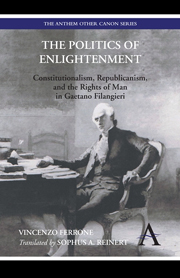 The Politics of Enlightenment
The Politics of Enlightenment from Part One - The New Politics ‘Ex Parte Civium’
Published online by Cambridge University Press: 05 February 2013
After centuries of general oppression, may the revolution which just took place across the oceans, offering all the inhabitants of Europe an asylum against fanaticism and tyranny, instruct those who govern men in the legitimate use of their authority.
D. Diderot, Essai sur les règnes de Claude et de Néron (1782), II, § 74The Scienza della legislazione would have been something entirely different without the American Revolution. Less passionate and prophetic, perhaps more traditional and predictable, it would certainly lack those original traits which make it a milestone of Western constitutionalism.
That epochal event gained a ‘strong character of exemplarity’ for Filangieri that in fact marked his most inspired and durable pages, gave vigour and courage to his most radical political positions, and constituted both a subterranean current in, and the tenacious red thread of, his enormous oeuvre. It is well known that the clamorous events across the Atlantic hit the spirit of the young jurist hard also on the human level, seriously influencing the tormented civil and political experience of late eighteenth-century Naples. They were really sincere, in this sense, the words that the young cadet of the ancient house of the Princes of Arianello addressed to Benjamin Franklin on the second of December 1782, asking him to favour his transfer to America:
Philadelphia has attracted my gaze ever since I was a child. I have so gotten used to consider it the only country in which I can be happy that my imagination cannot rid itself of this idea… But how can one leave the service of one's own prince without a cause to justify the decision? […]
To save this book to your Kindle, first ensure [email protected] is added to your Approved Personal Document E-mail List under your Personal Document Settings on the Manage Your Content and Devices page of your Amazon account. Then enter the ‘name’ part of your Kindle email address below. Find out more about saving to your Kindle.
Note you can select to save to either the @free.kindle.com or @kindle.com variations. ‘@free.kindle.com’ emails are free but can only be saved to your device when it is connected to wi-fi. ‘@kindle.com’ emails can be delivered even when you are not connected to wi-fi, but note that service fees apply.
Find out more about the Kindle Personal Document Service.
To save content items to your account, please confirm that you agree to abide by our usage policies. If this is the first time you use this feature, you will be asked to authorise Cambridge Core to connect with your account. Find out more about saving content to Dropbox.
To save content items to your account, please confirm that you agree to abide by our usage policies. If this is the first time you use this feature, you will be asked to authorise Cambridge Core to connect with your account. Find out more about saving content to Google Drive.